In the first chapter of his Essai sur les données immédiates de la conscience, Henri Bergson (1856-1941) wrote: « If gracefulness prefers curves to broken lines, it’s because a curved line changes direction at any moment, but each new direction was indicated in the one that preceded it. The perception of ease of movement is therefore mixed with the pleasure of stopping the march of time, as it were, and to hold the future in the present.”
This was part of Bergson’s discussion of the challenge we have of quantifying emotions and sentiments, for they are not potatoes or numbers. How much is “great” sadness, or a “bit of” joy? It was the first step in his consideration of time as “duration” versus quantifiable or spatial time.
Reflecting on his lines, which I included in a chapter about time and watches (Wristwatch Annual 2024), I have often noted that certain moments in time that are connected with feelings, emotions or sentiments do indeed have an effect on time perception. We mostly believe that life/time goes in some sort of straight line, even if we know, rationally, that the road is strewn with bumps and potholes. Nevertheless, we are sometimes surprised dramatically, joyfully, banally, or even lethally, and time disappears, or, better yet, opens a cocoon into which we slip and feel free of that dimension that is none other than God’s executioner.
The experience
Bergson’s line shot to my head when I recently stepped out of a train one stop too early. I am sure you know the feeling, you can comment below… I had spent three intense and boisterous days in the Bavarian town of Bad Reichenhall (near the border to Salzburg), where I had been invited to celebrate the 25th anniversary of Kobold Watches and a special project brand founder Michael Kobold was launching and about which I should be writing. My flight back home was on Sunday morning early from Munich, so I had decided to play it safe and take a train at night to get to the airport at about 1.30 a.m. and find some place to nap, along with other stranded travelers.
The schedule was simple: departure at 10:37p.m. to nearby Freilassing, where I’d pick up the Regional train at 11:10 p.m. to Munich East, and then the S-Bahn to the airport, arriving around 1.35 a.m. Obviously, when I heard “Freilassing” announced, I stepped out. The problem was that the sound of the train had muffled the second word that disembodied female voice had said: Hofham…a village just before Freilassing.
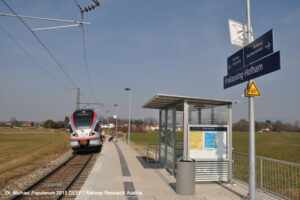
I sensed immediately that something was wrong. I remembered Freilassing train station from having passed through it many times in my Munich days. It was a busy border hub with rows and rows of tracks. But as my train pulled away into the night, all I saw was a single track, a little shelter, dark fields, and the edge of a village (Hofham).
It was 10:55p.m. The schedule posted in the shelter told me: No more trains to Freilassing, where I knew I could pick up the last train to Munich at 1 a.m. Time had just split open and led me into a space where everything seemed to float. Bergson’s “graceful curve” shaped by my absentmindedness – a perfect term, right? – was pointing into a relatively unknown, unplanned moment, 90 minutes of total freedom and disconnect, time elastic.
So, I cut out on foot along a dirt path following my departed train. The nocturnal air smelled a bit of cows and wet grass. It had rained. I veered off into a dark field, splashed in some puddles, heard a dog bark, a train, and the sounds of a Saturday night party, loud voices in the distance. I soon reached the outskirts of Freilassing, passed a big playground, and finally connected back with the tracks that ran to the main station along some uninspiring industrial buildings.

The waiting room was brightly lit, a 1950s construction with a high ceiling, no-frills, mostly bare walls, a dark tile floor and a vending machine. On a curious oblong bench in the middle sat a big black and white cat. Someone had dumped some tuna fish on the floor, but the cat was not interested. I greeted him, and he stared at me for a moment, then jumped down and sniffed my shoes and suitcase, demanded to be petted, and went back to his perch.
Reality calls
Interrupting the feeling of spacelessness and timelessness, was a nagging voice drawing me back to geometric reality. It said the following – you know the feeling I am sure – not as a string of words in time, but as a single, instantaneous, breathless thought meteorite:
“Your phone battery is almost at zero, your train ticket is on that phone, and the train you want to take in 90 minutes is an Intercity, not a Regional, so you will have to purchase a surcharge with your phone, or have an argument with the controller… And if you fall asleep on that train, you might miss Munich and end up in Stuttgart, miss the plane, you have to charge that f***ing phone, it’s your alarm clock.”
And on and on, a future full of stumbling blocks.
The curse of the smartphone tying us to the prison of real, planned life. I searched the waiting room for an electrical outlet. Surely someone vacuumed this place occasionally, so where’s the plug? The two vending machine (were there two?) had none visible. I had to continue my night wandering and find a solution elsewhere. The cat followed me to the door, but thought the better of it and regained his bench.
Some gangly kids were on the stoop outside chatting, probably waiting for an arrival. I greeted them and began my aimless roaming again, through the long, graffiti-smeared underpass crossing over to what seemed to be the center of town, up cement stairs, across empty streets, left turn into a shop-lined street, all dark, then right, the ambient emptiness pulling me along like an eager dog on a leash. The sense of being untethered, alone, in the dark was a balm to the soul. But the word “plug” occasionally hit my consciousness, like an icicle falling on a bald head. Oh, Bavaria…. Every village had a Wirtshaus, where a few noisy fellows came to drown their troubles on a Saturday night…? Surely Freilassing had one…
It was then that, I spotted a pizzeria with an open door. Osteria con cucina, La Bottega da Lisa… Yellowish light spilled onto a tiny terrace. I had visions of the manger in Bethlehem. A woman was cleaning the floor. Behind the counter a man wearing a baseball cap backwards was rummaging around, cleaning, too, I guess.
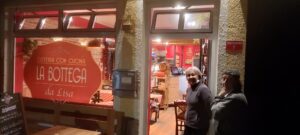
Standing in the doorway, I greeted the woman and asked if I could order an espresso and charge my phone, quickly explaining my absurd situation. “I am sorry, we have closed already, but you can charge your phone while I clean up,” she said kindly. She had an Eastern European accent, Polish as it turned out. She chatted with the man in Italian, something about food.
She asked me if she could bring me something to drink. My throat was dry, so I ordered a mineral water. As I drank, she mopped. Her husband came out and smoked a cigarette. His name was Luigi, he was from Salerno. He could have stepped out of a canvas by one of those early Baroque Italianate Dutch painters, like Jan Steen. He had strong, working hands, like roots of a tree, probably from kneading so much dough. Radio Italia was playing songs, and he occasionally sang along, the bits he knew…
Lisa and Luigi
The woman’s name was Lisa I assumed. She came outside while waiting for the floors to dry. We started chatting on the little terrace, all three of us, meandering through myriad subjects, from the society’s forced addiction to phones (my issue), to the absurdities of 24-hour pizzerias where robots made and served the pizza. She knew a few, and they repulsed her… “People have to meet face to face,” she gesticulated, “talk with each other.” We jointly condemned our Brave New World, sitting there like Huxley’s savages, speaking, communicating, enjoying a chunk of timeless time, escapees from the horological Diktat. She mentioned the damage she felt it was doing to children “who hardly know what food is anymore, they think it comes off a shelf.”
She and Luigi had had another place previously, she told me, where they had invited children to make pizza. “They used their hands to spread the mozzarella and the tomatoes, and then slid the pizza into the oven and were amazed,” she related, while her hands performed the narrative. Luigi got animated at this point and spoke about fresh pasta.
I told him of the first time I had seen fresh-made pasta was in a shop in Circeo, south of Rome, when I was twelve years old. I, who only knew the hard stuff in boxes, remembered someone cranking spaghetti out of a machine, and another person cutting raviolis. He confirmed my memory by hand-signing “with a rolling cutter,” and said it in Italian. The fresh pasta seemed grayish-white in my memory, whereas the usual industrial pasta was yellow and brittle. “That’s not good for you,” he vigorously explained. “Do you know why pasta is yellow?” I was asked. I had never thought of it, actually, so I said no. “It is dried too hot, and it is bad for you,” was the gist of his excited answer. He then took me into the restaurant, seized a bag of pasta from a shelf. It was white-ish. “This is dried 40° to 50° degrees!” he explained.
The lesson
Somehow, this information – nay, the whole conversation – delivered in Freilassing at between 23:40 and 00:40 elevated my spirits. This momentary world was populated with wonderful people.
The floors were now dry. I had to go, thanked them for the congenial hour, picked up my phone now charged to 75%, and wandered off into the night, light-footed, optimistic, to catch the 1 a.m. train.
When I got back, the cat was still there, and so was his tuna fish. The train was late, but that didn’t matter. I quickly purchased my surcharge, set the alarm clock for 3:20 a.m., a few minutes before it would arrive in Munich East, where I’d catch the S-Bahn to the airport.
The stretch of time between the moment I had stepped off the train at the “wrong station,” to the moment I sat on a cold bench on Platform 8 in Freilassing, seemed like one big lesson. It was not just about pasta. In the-90 plus minutes I had spent in that real estate, I had been as totally in the present as one can be, totally at ease with everything I encountered. Everything else had vanished, the terrifying wars ripping humanity apart, the absurd cacophony of the American election campaign, the daily worries about finances, the endless irritations of our original sin of being born. Sure, narrating it involves slicing up the time span into physical moments as I have done above. But it’s the whole picture that contains the treasure. Ninety minutes of pure duration, ninety minutes of graceful curves given without judgment, taken with a calm heart..
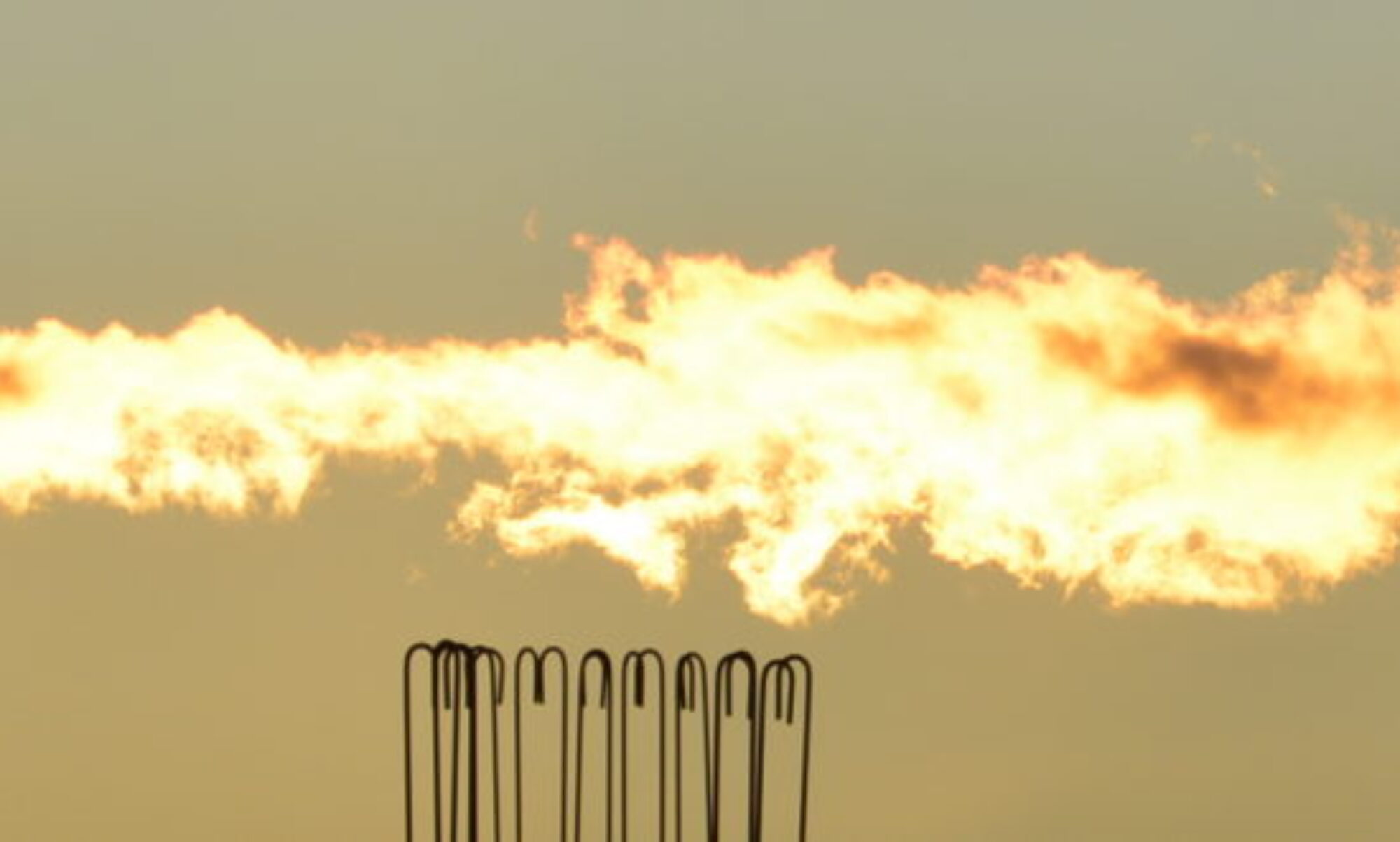
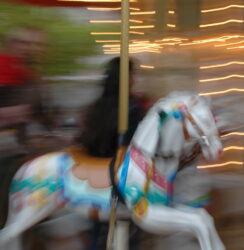

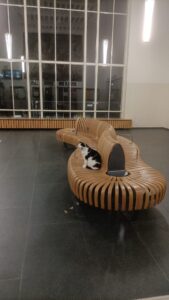


Striking text and the link with Bergson is brilliant.
That’s beautiful. And a reminder to travel light! If it happened to me, I’d be dragging my suitcase behind me …
What an adventure nby night!
How lovely the angel said:get out of the train.
On your track you could have fallen, break sth. spend the night in a German hospital. But NO
The cat as a mittener of God’s opened somehow your spirit and you found on your path lines of your ancestors.
Gratulation for your fine snsations
Like a pigeon it’s home